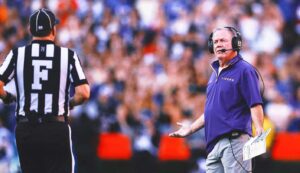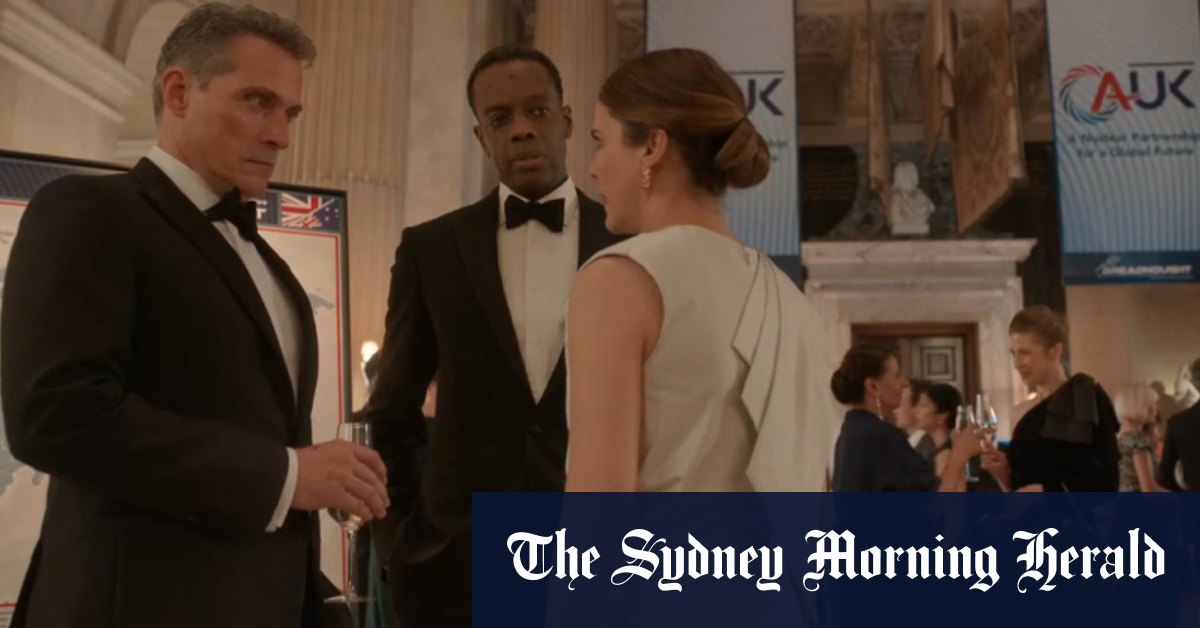
At a special dinner at Blenheim Palace, thrown in honour of the chief of the Australian navy, the British prime minister – speaking off-the-record to a room of military chiefs, diplomats and senior bureaucrats – offers a gentle roasting over the aborted deal to buy French submarines.
“You were untrue to the French,” he says, to titters. “You said you’d welcome their well-crafted submarines, and you have forsaken them for ours.”
Picking up a small model of a submarine from the table, he adds: “It’s a love triangle and a proboscis.” More laughter. “The next time we have dinner, we’re inviting the French, is my point.”
This scene plays out in the final episode of the second season of Netflix’s riveting political drama The Diplomat, but it’s so clearly informed by real-world events that it’s easy to imagine something very like it actually happened.
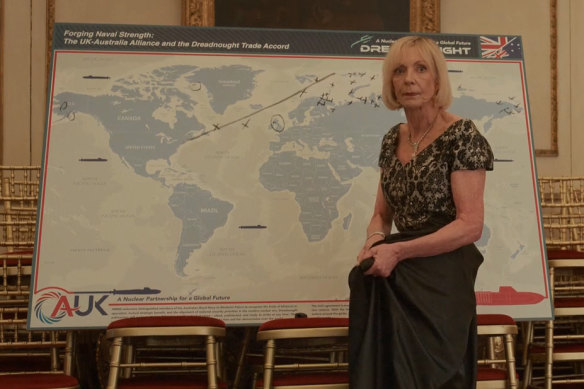
US Vice President Grace Penn (Allison Janney) explains the machinations of the Australia-US-UK alliance to ambassador Kate Wyler (Keri Russell) in The Diplomat.Credit: Netflix
But for anyone who imagines we are an equal partner in the much-vaunted “special relationship” with the UK and the US, there’s a reality check: across six episodes and five hours, Australia gets just three minutes of screen time. And even then, we’re mostly being talked about rather than actually talking.
Australia first crops up almost as an afterthought halfway through episode five, when US Vice President Grace Penn (Allison Janney) springs a visit on America’s ambassador to the UK, Kate Wyler (Keri Russell).
As their chiefs of staff diarise, they land on a coming event, “the Australian dinner”.
“Which is what,” asks the VP’s chief of staff, Nora (Rosaline Elbay).
“The Australian navy chief’s been here for the Dreadnought deal,” says the ambassador’s chief of staff, Stuart (Ato Essandoh).
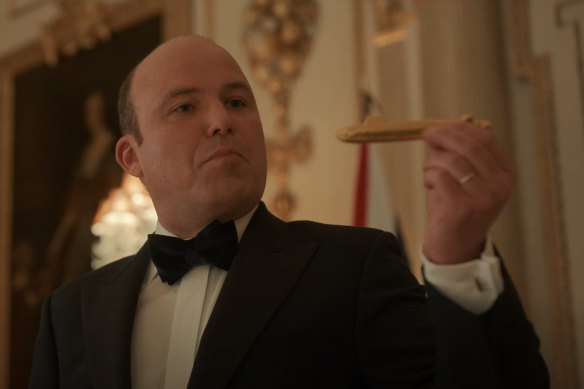
The British PM and his “proboscis” of a submarine.Credit: Netflix
“Which one’s that?”
“The one the French called ‘a knife in the back’. You know.”
“I don’t.”
“Australia was gonna buy submarines from France. They backed out and got them from the UK instead.”
“Ah.”
The reference is to the deal Australia signed with France in 2016 to purchase 12 diesel electric-powered submarines to replace its existing Collins submarine fleet. That agreement was torn up by the Morrison government in 2021, when AUKUS – an agreement to transfer technology and information so nuclear-powered (but conventionally armed) submarines could be procured by Australia – was signed between Britain, the US and Australia.
French Foreign Minister Jean-Yves Le Drian called the deal “a stab in the back”, while French President Emmanuel Macron famously told journalist, now Sydney Morning Herald editor, Bevan Shields, “I don’t think, I know” that Morrison had lied to him.
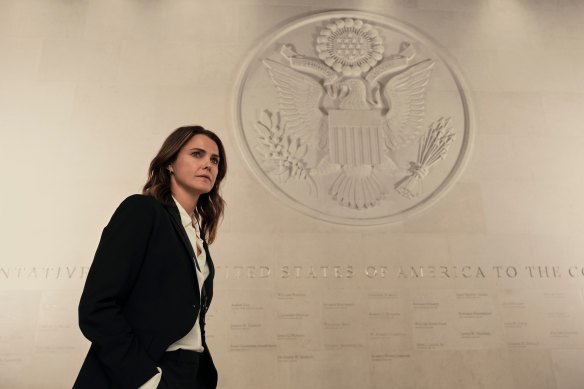
Keri Russell as ambassador Kate Wyler.Credit: Alex Bailey/Netflix
Back in the fictional world of The Diplomat, this act of international bastardry makes for a fleetingly awkward moment for British Prime Minister Nicol Trowbridge (Rory Kinnear). Telling his top spy that the American VP would like to be present at the dinner, he asks, “Will it make the French hysterical?”
“Possibly,” is the answer. Never mind, says the PM. Manage it.
Well, at least we rank above the French in this pecking order.
As he’s about to enter the special dinner, Australia’s naval chief, an Admiral referred to as “Kenny” (movie database imdb lists the character as Admiral Ruland, but as the junior partner in this relationship, we get only the first name), is met by the PM.
“Admiral, I believe you know the vice president.”
“I certainly do,” he says, smiling and extending his hand to Grace Penn. “I was guest of honour until you showed up.”
“I don’t know why I wasn’t invited in the first place,” she says.
“Well, I was quite sure that Kenny wouldn’t like the competition,” says Trowbridge, at which the Admiral chuckles approvingly. Incidentally, the actor who plays him, Simon Thorp, is English.
Inside the palace, banners announce the occasion: “AUK: A nuclear partnership for a global future.”
It’s the fictional version of AUKUS, which in August entered a new phase when the “agreement … for co-operation related to naval nuclear propulsion”, signed by the three partners, was tabled in the Australian parliament.
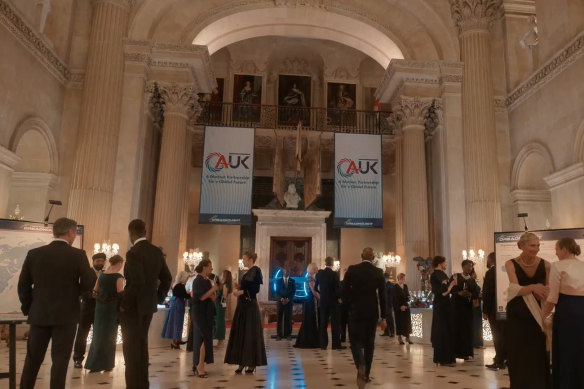
Well, this is a little bit auks: A scene from season 2, episode 6 of The Diplomat.Credit:
Over cocktails at the palace, the Australian naval chief concedes the French were furious at him. “To be fair, you earned it,” observes Grace Penn.
“Give them another month, I’m sure they’ll move on,” offers the British foreign secretary, Austin Dennison (David Gyasi).
“They’d better,” says Admiral Kenny. “We’ve paid them over half a billion Euros to get the f— over it.”
The crowning moment of all this playing with the big boys comes at the dinner itself. But soon after those gags about the fuming Frenchies, the action moves on.
We have done our bit, played our small part in the skulduggery and intrigue that fuels this eminently watchable series. Australia has been cast as minor, feckless, a little bit of a wild card. It’s not terribly flattering, but hey – at least we’re not French.



